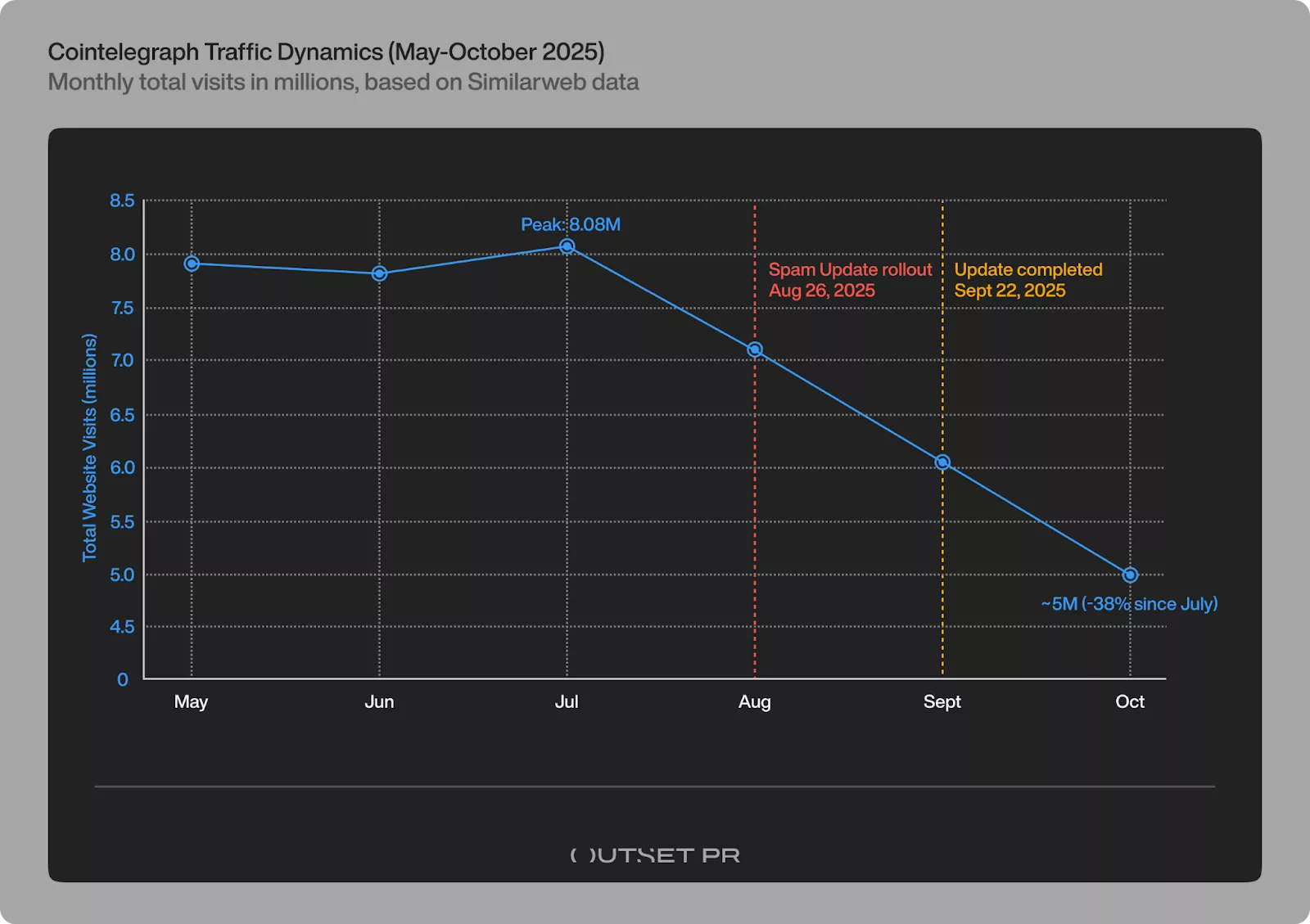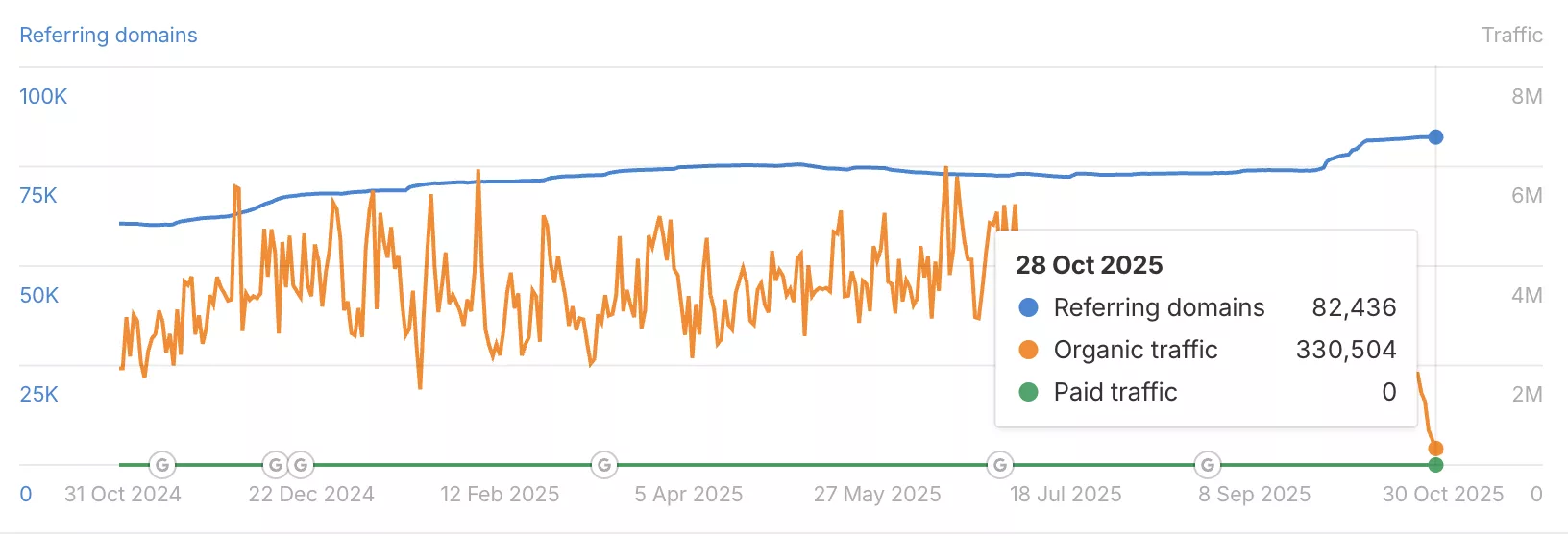A data-driven analysis of Cointelegraph’s traffic collapse and the shifting algorithmic forces redefining visibility in crypto media.
Even in crypto, where volatility is something the industry has long gotten used to, few expected to see Cointelegraph — one of the most recognized and authoritative names in crypto journalism — vanish from Google’s search results. Once dominating crypto-related queries and frequently featured in the Top Stories section, the outlet’s URLs have now all but disappeared.
This has left many across the crypto media industry scratching their heads over what went wrong with the outlet itself. But on second thought — when considering Cointelegraph’s history, reach, and reputation — another question arises: what is Google doing to the information landscape?
We analyzed Similarweb and Ahrefs data to take a closer look at what might have triggered the change in visibility, how it fits into Google’s latest algorithmic behavior, and what lessons crypto publishers can draw before the next invisible switch flips again.
Google’s Update Wiped Out 1M Monthly Visits from Cointelegraph
Earlier in 2025, Cointelegraph’s traffic saw modest dips of less than 2% in May and June. Traffic peaked at 8.08 million visits in July 2025 after that — a strong 42% month-over-month increase.
However, after reaching the July peak, its traffic fell by 12.4% to 7.08 million in August and then further by 14.8% to 6.03 million in September. Preliminary October estimates suggest around 5 million visits, meaning Cointelegraph has been losing roughly 1 million visits per month for the past three months — a decline unseen in previous years.

Ahrefs data reinforces this picture: Cointelegraph’s estimated organic traffic plunged from around 3.8–4 million in mid-2025 to just over 300,000 by October 29, 2025 — a dramatic 90% collapse.

This convergence of Similarweb and Ahrefs data indicates that the downturn wasn’t a gradual loss of interest but a sudden algorithmic devaluation. The timing matches Google’s major update cycle: on June 30, a Core Update boosted visibility for 63% of media outlets globally, with some recording traffic spikes of up to 80%. Then, on August 26, Google initiated a month-long Spam Update, completed on September 22, 2025.
Once it finished propagating, its impact became visible almost immediately across the media landscape. By late September, 77% of top crypto media saw their traffic fall, and the biggest outlets — those drawing over 1 million visits — lost between 14% and 50% of their visibility. Cointelegraph was among the first to drop: it showed early signs of decline at the start of September, a brief stabilization in the third week, and then a renewed downward trend afterward.
For a striking comparison, NewsBTC moved in the opposite direction. Its traffic doubled from 2 million visits in August to over 4 million in September — a whopping 164% increase. Preliminary estimates put its October visits at around 5 million.
Cointelegraph’s traffic composition adds further context:
- 52% from direct visits — a strong signal of brand loyalty.
- 33% from organic search (primarily Google).
- 5% from referrals.
- 9% from social platforms, mostly Twitter (X).
That 33% organic search slice was the first to bear the brunt of Google’s algorithm shift. And because direct traffic remained stable, the proportional loss appeared even sharper.
The New Information Hierarchy
Taken together, the data point to how Google algorithms have evolved from rewarding expertise to experimenting with ecosystems where once-famous sites can lapse into obscurity overnight.
We’re now operating within a system of opaque algorithmic signals, where updates arrive without clear communication or predictable recovery paths. One week, a site surges; the next, it disappears — and no explanation follows.
Compounding the problem, Google’s AI-driven “helpful content” framework increasingly promotes mainstream outlets with broad topical authority over specialized crypto publications. Crypto journalism falls under Google’s “Your Money or Your Life” (YMYL) category — where algorithmic scrutiny is far stricter. In practice, this means crypto outlets compete not only with mainstream media for visibility but also with the elevated credibility standards applied to financial content as a whole.
The rise of AI Overviews and zero-click results keeps users increasingly within Google’s own ecosystem, depriving publishers of the traffic that once came from search clicks.
But Google is no longer the only gatekeeper in this evolving attention economy. According to Similarweb, Cointelegraph’s referral analytics show that nearly a third of its referral traffic now comes from ChatGPT — averaging 25–28% over the past three months — with an additional 4–5% from other large language models (LLMs).
AI assistants are channeling readers through conversational interfaces instead of traditional search or social platforms — essentially becoming new distribution intermediaries in content discovery.
Can Cointelegraph Recover?
History suggests that even the most severe algorithmic blows aren’t always permanent. Websites that once seemed buried have rebounded through systematic adaptation. Cointelegraph’s fall is dramatic, but not necessarily final.
From the SEO and data perspective, recoveries after large-scale Google updates usually take one to three core update cycles — roughly 3–9 months. But in Cointelegraph’s case, there are specific conditions that could influence the timeline.
The strongest factor in Cointelegraph’s favor is its brand loyalty, as over half its readers come directly to the site. In SEO recovery models, this “brand buoyancy” often acts as a stabilizer. In other words, Google might have downranked Cointelegraph’s pages, but not its reputation.
From the bad-news angle, the September spam update was one of the most complex rollouts Google has executed in years. Unlike core updates that recalibrate authority signals, spam updates use machine-learning classifiers to detect what Google interprets as “search manipulation” or “thin value.” These classifiers operate on a domain-wide level, meaning recovery isn’t just about fixing technical SEO — it often requires rebuilding trust across thousands of pages.
Assuming no manual penalty, Cointelegraph could begin to recover partial visibility within 60–90 days, as Google’s systems reprocess quality metrics. Full recovery, however, may depend on the next core update window — potentially Q1 2026 — if the current spam filters are reweighted or corrected.
Still, the real takeaway might not be “how to recover.” It might be how to stop depending on Google in the first place.
It’s Time for Crypto Journalism to Build on Its ‘Own Land’
A hard truth exposed by the Cointelegraph case is that, for too long, crypto journalism has been building on borrowed land — relying on Google to decide what gets seen and by whom. Perhaps the time has come to claim its own territory: newsletters, communities, and direct channels where audiences engage because they trust the brand, not because an algorithm recommended it.
Publishers who control their distribution channels will survive. Decentralized content distribution, token-gated communities, and blockchain-based verification of authorship are not futuristic ideas — they’re the next logical step. In a sense, the decentralization ethos that drives blockchain innovation can — and should — also power the next evolution of crypto journalism itself.
Disclosure: This content is provided by a third party. Neither crypto.news nor the author of this article endorses any product mentioned on this page. Users should conduct their own research before taking any action related to the company.
